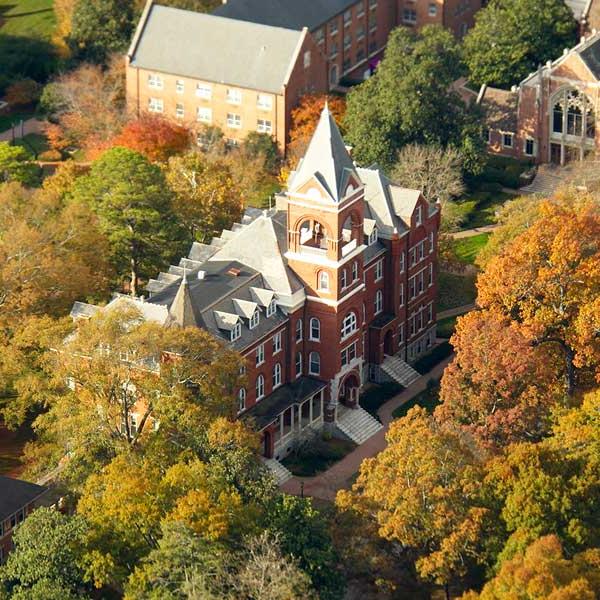Agnes Scott is planning and implementing a number of activities to reduce our energy use. 我们首先关注能源效率, prioritizing equipment replacement and building envelope improvement projects. 我们现在通过一个 环保循环基金. We have also recently invested in renewable energy around campus.
Our energy reduction efforts stem from our commitment to the American College & University Presidents’ Climate Leadership Commitments. Agnes Scott signed the Commitment in September 2007. We submitted our baseline greenhouse gas emissions inventory on September 15, 2008. Our Climate Action Plan (CAP) was completed during the summer of 2009 and submitted to the ACUPCC on the September 15, 2009. In it, we projected the college would be climate neutral by 2037.
自2018年以来, the college had reduced its carbon footprint by 30% and we are on track for 50% reduction by 2022. 你可以跟踪我们的进度 第二自然网站在这里.
A climate action plan (CAP) is a roadmap for how an institution will reduce its net carbon emissions to zero over a certain period of time. Universities and colleges generate carbon emissions from their infrastructure, 特别是通过购买化石燃料能源, utilizing greenhouse gas-emitting refrigerants, and 'indirect' sources like travel for study abroad and daily commuting.
Our CAP strategy is to reduce our energy usage by installing higher-efficiency equipment and promoting energy-保护 behaviors, 同时增加我们的可再生能源. Lastly the college will use carbon offsets to cover the emissions that are impossible to avoid or replace.
这些行动的顺序是至关重要的. 第一个, we reduce our total energy demand by energy 保护 (education) and energy efficiency (equipment upgrades). Then, we purchase renewable energy to transition our energy consumption to clean sources. 最后, we purchase carbon credits to offset the portion of our footprint we cannot avoid with efficiency, 保护, 或可再生能源.
In 2007, President Elizabeth Kiss signed the American College & University Presidents' Climate Commitment (ACUPCC), 因此, ambitiously committing 正规博彩十大网站排名学院 to carbon neutrality by 2037.
的承诺, 从那时起, has evolved into the Climate Leadership Commitment facilitated by the non-profit organization Second Nature. The transformation, however, did not only come in the form of a name change. We have also committed ourselves to setting a resilience strategy for our community, 与迪凯特市合作. Despite challenges like campus community growth, and lack of innovative and robust renewable energy programs in Georgia, we have made significant progress toward our goal to reduce our net campus carbon footprint to zero.
此外, the 可持续发展中心 staff has revisioned the trajectory of our journey to carbon neutrality and gained further insight on solutions that fit our unique context.
Agnes Scott’s Sustainability Steering Committee (SSC) requested that the energy efficiency and alternative energy subcommittee that guided the GHG emissions inventory also guide the CAP.
This subcommittee has been led by three co-chairs: our director of facilities, 化学教授, and an alumna who served as a member of Georgia’s Public Service Commission. 联合主席和其他小组委员会成员 met several times in the fall of 2008 to discuss what information was needed in order to decide on potential carbon emissions reduction goals. The same student intern who conducted the GHG emissions inventory collected the necessary information as a work-study student in 2008-2009. Together with the college’s sustainability staff, she also reviewed climate action plans and reports, along with case-studies from other colleges and universities.
2009年春天, the subcommittee looked at potential reduction goals and agreed to report on several reduction scenarios to the full SSC and the Board of Trustees. The reduction estimates were based on specific research, such as:
- Conservation: estimates based on available information about past reductions at Agnes Scott due to 保护 messaging. Also based on research about reductions achieved at other colleges and universities.
- Efficiency: estimates based on a three-phase mechanical retrofitting plan combined with energy saving projects from the deferred maintenance plan.
- Renewable energy: estimates based on a professional assessment of potential roof-top solar capacity.
- The SSC and Trustees responded with support for the scenarios, asking the subcommittee to return with refined reduction options.

